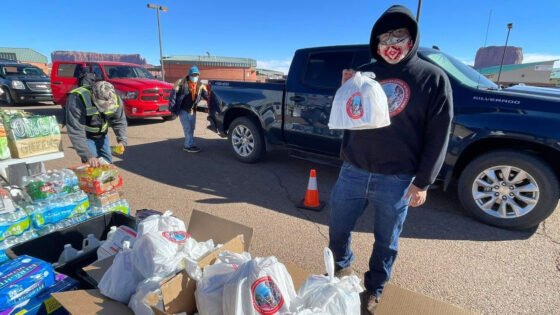CH’ÍHOOTSOOÍ, DINÉTAH, WINDOW ROCK, NAVAJO NATION – What started as a group of Indigenous matriarchs protecting their communities against the COVID-19 pandemic has grown into an internationally recognized non-profit that is working to protect lives, culture, and language.
On March 15, 2020, before the first Navajo case of COVID had been detected, founder and former Executive Director Ethel Branch organized a group of Indigenous matriarchs, launched a GoFundMe site, and formed what became Yee Ha’ólníi Doo DBA Navajo & Hopi Families COVID-19 Relief Fund.
Branch anticipated the impacts that the virus would have on the Navajo and Hopi nations.
Interim Executive Director Mary Francis said the Relief Fund had organized ahead of tribal department shutdowns and the resulting food and PPE shortages.
“The existential threat posed by the COVID-19 pandemic to the Navajo and Hopi nations inspired us to form a grassroots organization that brought over $12 million in pandemic relief to almost half a million Navajo and Hopi people,” Francis said. “We organized hundreds of volunteers who stepped forward to deliver relief items throughout a vast and remote area the size of West Virginia.”
The Relief Fund has served over 500,000 Navajo and Hopi tribal members, trained 30 teams that include a network of nearly 1,300 tribal volunteers, and distributed over 10 million masks.
Relief Fund Deputy Director Cassandra Begay led PPE distributions across both tribal nations.
“We dedicated resources to purchase PPE to serve our most vulnerable populations like our elders, immuno-compromised, frontline workers, and struggling families. Our mission was to protect as many people as we could,” Begay said.
The Relief Fund also partnered with Made to Save on a vaccination campaign that reached over 807,000 Navajo and Hopi members.
The principle of strengthening Navajo and Hopi communities against the vulnerability they experienced during the pandemic has guided the organization to develop and implement programs that support long-term resiliency and pandemic-proofing.
As the Relief Fund celebrates its third year in operation, Begay said the organization is positioned to build back a stronger nation and strengthen the next generation of advocates.
“Many of our community members on the Navajo reservation do not have access to basic infrastructure like clean running water, internet, healthcare services, or housing. I believe the future can be better. We are ready to advance our work to serve our communities,” she said.
The generosity of donors and grant funders has helped to finance endeavors like the Tooh Haltsooi Community Center in Sheep Springs, N.M., which was launched on January 7, 2023.
“We’ve taken a strategic approach in selecting locations for these community centers, taking into account the existing needs and resources available on the Navajo Nation,” Francis said. “Our goal is to provide our people with more impact in their community and to leverage the talent of our people by providing them the tools they need to succeed.”
The programming implemented at the community centers focuses on culture and language preservation, food security, entrepreneurism, sustainability, and self-sufficiency.
Since the start of 2023, Yee Ha’ólníi Doo has secured its 501c3 non-profit status while also undergoing a change in leadership.
“We are now at an imperative juncture of fundraising to sustain the operations of our centers. It’s taken a lot of time and effort to gain this status but now that it has been done, the next step is to raise the necessary funds to operate our centers,” Francis said.
While the Relief Fund still monitors the number of new COVID-19 cases on the Navajo Nation, the organization’s efforts are transitioning from direct relief programming into long-term sustainability and pandemic-proofing programs.
“As a non-profit organization, our goal has remained to uplift and protect our communities from the vulnerability we experienced during the pandemic,” Francis said. “Thank you for your generous backing. Your support is making a difference in our communities.”





